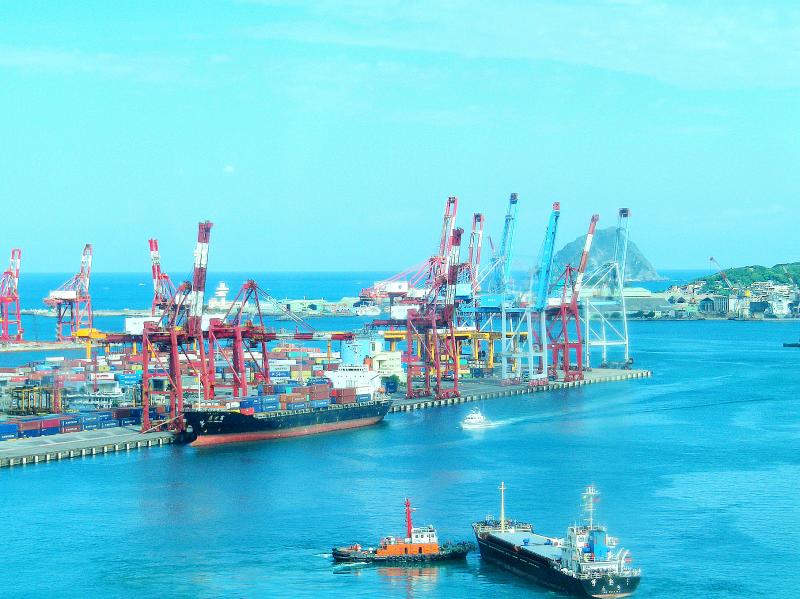State-run Taiwan Power Co (Taipower, 台電) has denied media reports that a proposed new liquefied natural gas (LNG) terminal in Keelung would create traffic jams and pose safety risks to one of the country’s busiest ports.
Taipower’s plans to build the new LNG terminal, the country’s fourth, are designed to accommodate the conversion of the nearby 2,000-megawatt oil-fired Hsieh-ho Power Plant into a gas-fired plant.
The utility’s initial proposal to build the terminal off the coast of Keelung’s Waimushan (外木山) was put on hold after critics said that it would endanger a coral reef.

Taipower then issued a revised proposal to move the terminal’s location from the west to the east side of the power plant, closer to the mouth of the Port of Keelung.
The plan is undergoing a preliminary environmental impact assessment.
The Chinese-language United Daily News yesterday published a front-page report quoting anonymous Keelung Port officials as saying that the utility was moving ahead with the plan “at all costs,” disregarding its impact on port operations so that it can meet Taiwan’s energy needs.
LNG shipments would snarl ship traffic in the port and create a risk of gas leakage or explosions, which could force a stoppage of port operations and risk injuries, the newspaper quoted the officials as saying.
Taipower yesterday strongly denied the claims in a statement, saying that a similar LNG terminal inside the Port of Taichung has received more than 1,000 gas shipments without any adverse impact on ship traffic.
The utility said it had also conducted “simulations” showing the terminal would not affect ship traffic, and pledged that as long as the facility was effectively managed, it would not pose any danger to the port.
Taiwan has in the past few years relied on an increasing number of LNG imports as it attempts to meet the government’s goal to phase out nuclear power.
LNG last year accounted for 37.2 percent of Taiwan’s energy mix — compared with only 25.46 percent in 2011 — while coal accounted for 44.30 percent, nuclear 9.55 percent, oil 1.83 percent and pumped storage hydropower 1.09 percent.
The remainder came from a variety of renewable sources, Bureau of Energy data showed.
A plan to build the country’s third LNG terminal off the coast of Datan Borough (大潭) in Taoyuan’s Guanyin District (觀音) passed an environmental impact assessment in March.
The plan last year survived a national referendum to have the terminal relocated.

CHIP RACE: Three years of overbroad export controls drove foreign competitors to pursue their own AI chips, and ‘cost US taxpayers billions of dollars,’ Nvidia said China has figured out the US strategy for allowing it to buy Nvidia Corp’s H200s and is rejecting the artificial intelligence (AI) chip in favor of domestically developed semiconductors, White House AI adviser David Sacks said, citing news reports. US President Donald Trump on Monday said that he would allow shipments of Nvidia’s H200 chips to China, part of an administration effort backed by Sacks to challenge Chinese tech champions such as Huawei Technologies Co (華為) by bringing US competition to their home market. On Friday, Sacks signaled that he was uncertain about whether that approach would work. “They’re rejecting our chips,” Sacks

NATIONAL SECURITY: Intel’s testing of ACM tools despite US government control ‘highlights egregious gaps in US technology protection policies,’ a former official said Chipmaker Intel Corp has tested chipmaking tools this year from a toolmaker with deep roots in China and two overseas units that were targeted by US sanctions, according to two sources with direct knowledge of the matter. Intel, which fended off calls for its CEO’s resignation from US President Donald Trump in August over his alleged ties to China, got the tools from ACM Research Inc, a Fremont, California-based producer of chipmaking equipment. Two of ACM’s units, based in Shanghai and South Korea, were among a number of firms barred last year from receiving US technology over claims they have

BARRIERS: Gudeng’s chairman said it was unlikely that the US could replicate Taiwan’s science parks in Arizona, given its strict immigration policies and cultural differences Gudeng Precision Industrial Co (家登), which supplies wafer pods to the world’s major semiconductor firms, yesterday said it is in no rush to set up production in the US due to high costs. The company supplies its customers through a warehouse in Arizona jointly operated by TSS Holdings Ltd (德鑫控股), a joint holding of Gudeng and 17 Taiwanese firms in the semiconductor supply chain, including specialty plastic compounds producer Nytex Composites Co (耐特) and automated material handling system supplier Symtek Automation Asia Co (迅得). While the company has long been exploring the feasibility of setting up production in the US to address

OPTION: Uber said it could provide higher pay for batch trips, if incentives for batching is not removed entirely, as the latter would force it to pass on the costs to consumers Uber Technologies Inc yesterday warned that proposed restrictions on batching orders and minimum wages could prompt a NT$20 delivery fee increase in Taiwan, as lower efficiency would drive up costs. Uber CEO Dara Khosrowshahi made the remarks yesterday during his visit to Taiwan. He is on a multileg trip to the region, which includes stops in South Korea and Japan. His visit coincided the release last month of the Ministry of Labor’s draft bill on the delivery sector, which aims to safeguard delivery workers’ rights and improve their welfare. The ministry set the minimum pay for local food delivery drivers at